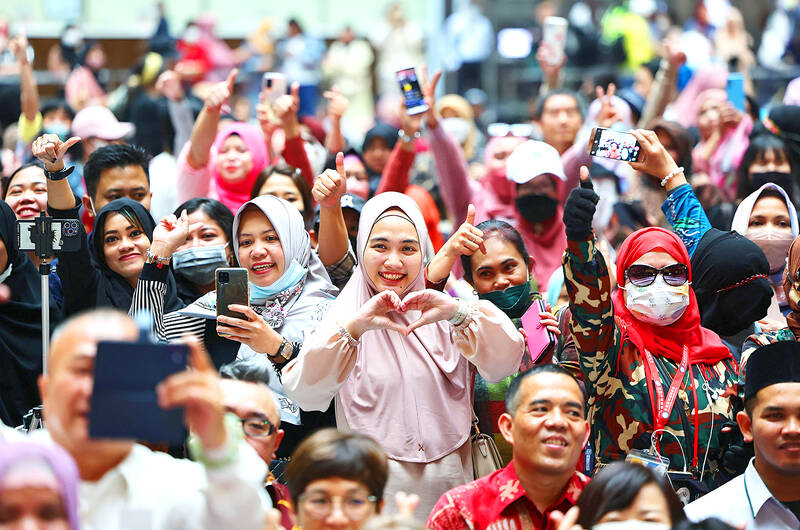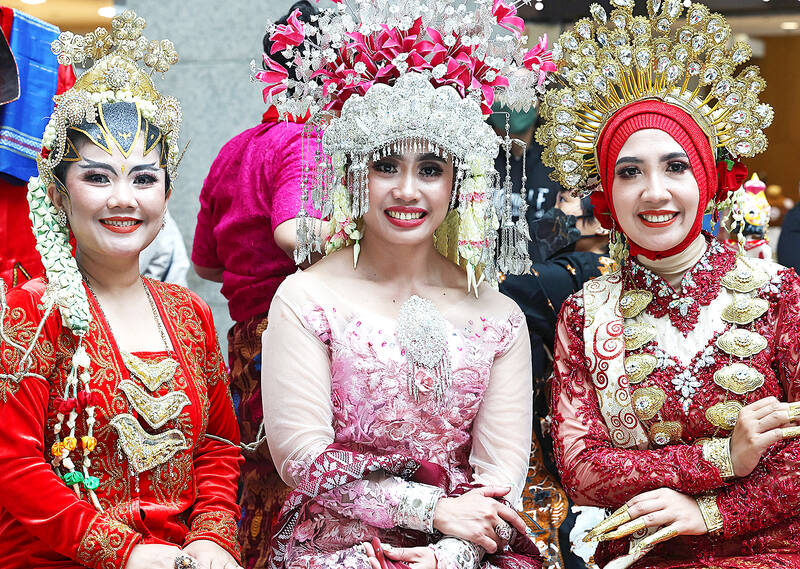In December of 2017, President Tsai Ing-wen (蔡英文) tweeted: “Today on #internationalimmigrationday, I want to thank all of #Taiwan’s immigrants who have made Taiwan a better, more diverse & multicultural country. Thank you!” This has been a refrain throughout the Tsai administration.
For example, last month Kaohsiung played host to a “Presidential Office Concert” that hosted 25 groups from several different nationalities. Back in May Vice President William Lai (賴清德), speaking at the 26th Global Chinese Culture and Arts Award, said that Taiwan must preserve its “multicultural heritage.”
After a discussion of Taiwan’s ethnic and immigrant groups, Taiwan at a Glance, a Ministry of Foreign Affairs (MOFA) publication on Taiwan, smugly observes that Taiwan is an: “open-hearted, forward-looking society that has incorporated diverse elements of civilization from around the world in a distinctive and harmonious manner.”

Photo: CNA
That’s the same MOFA that cruelly requests that Filipino applicants for marriage visas supply parents’ birth certificates and then rejects them for spelling errors and similar trivia. That’s the same MOFA that invents last-minute requirements for such applicants as well.
Mouthing ideas of “diversity” and “multiculturalism” is an important behavior across the political spectrum. The English Web site of the Taiwan People’s Party (TPP) has a defense of its presidential candidate Ko Wen-je’s (柯文哲) treatment of minority groups, for which he has been criticized. The Web page lists participation in the international Rainbow cities network, hosting Eid-al-Fitr festivals, indigenous language programs and certificate programs for immigrants as defenses of his positions.
A 2018 Taipei city news page about a speech he gave notes: “Speaking of Taiwan’s characteristics, he highlighted diversity, democracy, freedom and openness.”

Photo: CNA
All these sweet sentiments, but what is the reality? Last week we got a special treat as two of Taiwan’s most pernicious habits, its racist othering of foreigners and its indifferent and performative regulatory apparatus, combined in a double whammy of silliness.
‘FOREIGN’ CUISINE
After a mass food poisoning incident last week, apparently caused by bad food from a Vietnamese food stall in Jhongli (中壢) in Taoyuan, Focus Taiwan reported that the Food and Drug Administration (FDA) announced that “inspections of restaurants serving ‘foreign cuisine’ will be stepped up in the coming months.”
According to media reports, an FDA spokesperson specifically instanced the famed area of Little Myanmar in New Taipei City’s Jhonghe District as a place the program might target. This signaled that what officials meant by “foreign” in this case is cuisine from places where the skins are too brown, since I doubt they will be checking McDonalds or Ruth’s Chris Steakhouse.
The checking of “foreign” cuisine was also a reassuring election-time signal that ordinary Taiwanese would not be bothered. Small businesses are already unhappy with the Administration over the losses they took during the pandemic.
Taiwan veterans will also recognize the reflexive, performative move of the government announcing tough new policies after something bad happens, instead of before. Who can forget the gutter oil scandal of 2014 (over 1,200 firms affected) and the copper chlorophyllin oil scandal of 2013? Well, government officials, apparently.
After these scandals, inspection programs were put into place, just as after the tainted starch scandal of 2013, the expired milk powder scandals over the years, the plasticizer scandal of 2011, the methyl yellow tofu scandal among others.
The problems with recycled oil in night markets, which also led to new rules, should have signaled that there were a number of other urgent issues with food preservation that could use periodic inspection.
Sadly, we have three presidential candidates who could show some leadership here. Someone’s staff should have jumped on this immediately and had their candidate put out a statement. It is telling that from the standpoint of practical politics, it would have put the ruling party on the defensive, but nobody appears to have noticed the underlying racism of the FDA stance. Laudably, Focus Taiwan’s report noted it.
Recall that ugly moment early in June of 2021, early in the pandemic, when a reporter asked Minister of Health and Welfare Chen Shih-chung (陳時中) if the spread of COVID in migrant worker dorms was due to the “ethnic habits” of the workers. Chen shot that down emphatically.
We could use some of that right now. We need one of the candidates to step up and make multiculturalism mean something more than just official hosting interesting festivals.
I have long suspected that one reason Taiwanese find Singapore a model is not only because of its orderliness, but also because it represents a multicultural state lead by ethnic Han Chinese. Sure enough, Singapore has a whole system of official multiculturalism that runs on promotion of carnivals, including “Racial Harmony Day” carnivals and other activities.
Ko in fact has long instanced Singapore as a model for Taiwan. Last year he visited Singapore, mentioning that it had been the model for his bilingual education policies. In a 2014 interview with the Straits Times, he observed that “Singapore is a very good model for Taiwan... especially given the similarities in our culture.”
The “foreign cuisine” inspection feels a lot like the crackdowns in the pandemic on migrant workers in which migrant workers were blamed for COVID-19, which was used an excuse to crackdown on them. At that time Miaoli County Commissioner Hsu Yao-chang (徐耀昌), citing complaints that “foreign caregivers take elders out in wheelchairs and then ignore them while chatting in groups,” ordered that all migrant workers, including caregivers, be locked in. After all, he said, they were 80 percent of local cases. Changhua and Nantou, two counties with long histories of police harassment of migrant workers, called for similar measures.
This reflexive attack on things foreign needs a response from Taiwanese with social influence. After all, attacks on foreignness are an alarming marker of far right populism in other countries. If the ruling party is serious about responding to rising populism, this is a good place to start — with a retraction, clarification and, above all, an apology.
Notes from Central Taiwan is a column written by long-term resident Michael Turton, who provides incisive commentary informed by three decades of living in and writing about his adoptive country. The views expressed here are his own.

This is the year that the demographic crisis will begin to impact people’s lives. This will create pressures on treatment and hiring of foreigners. Regardless of whatever technological breakthroughs happen, the real value will come from digesting and productively applying existing technologies in new and creative ways. INTRODUCING BASIC SERVICES BREAKDOWNS At some point soon, we will begin to witness a breakdown in basic services. Initially, it will be limited and sporadic, but the frequency and newsworthiness of the incidents will only continue to accelerate dramatically in the coming years. Here in central Taiwan, many basic services are severely understaffed, and

Jan. 5 to Jan. 11 Of the more than 3,000km of sugar railway that once criss-crossed central and southern Taiwan, just 16.1km remain in operation today. By the time Dafydd Fell began photographing the network in earnest in 1994, it was already well past its heyday. The system had been significantly cut back, leaving behind abandoned stations, rusting rolling stock and crumbling facilities. This reduction continued during the five years of his documentation, adding urgency to his task. As passenger services had already ceased by then, Fell had to wait for the sugarcane harvest season each year, which typically ran from

It is a soulful folk song, filled with feeling and history: A love-stricken young man tells God about his hopes and dreams of happiness. Generations of Uighurs, the Turkic ethnic minority in China’s Xinjiang region, have played it at parties and weddings. But today, if they download it, play it or share it online, they risk ending up in prison. Besh pede, a popular Uighur folk ballad, is among dozens of Uighur-language songs that have been deemed “problematic” by Xinjiang authorities, according to a recording of a meeting held by police and other local officials in the historic city of Kashgar in

It’s a good thing that 2025 is over. Yes, I fully expect we will look back on the year with nostalgia, once we have experienced this year and 2027. Traditionally at New Years much discourse is devoted to discussing what happened the previous year. Let’s have a look at what didn’t happen. Many bad things did not happen. The People’s Republic of China (PRC) did not attack Taiwan. We didn’t have a massive, destructive earthquake or drought. We didn’t have a major human pandemic. No widespread unemployment or other destructive social events. Nothing serious was done about Taiwan’s swelling birth rate catastrophe.